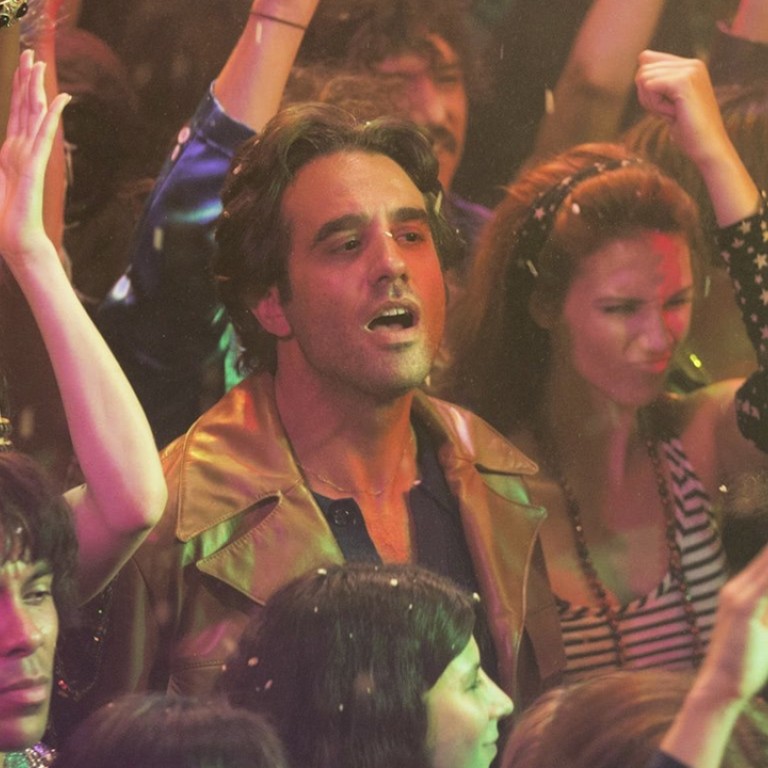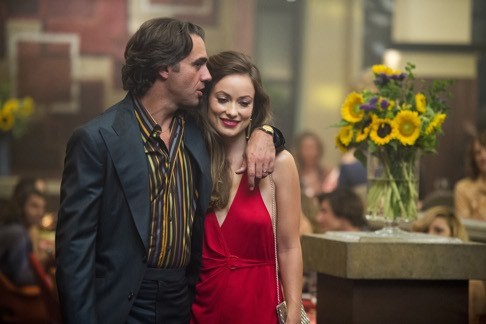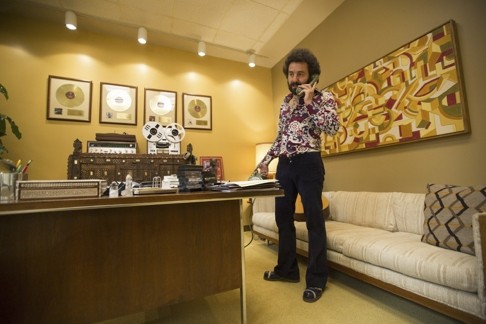
In Vinyl, Jagger and Scorsese expose the madness and passion inside the record industry
Mick Jagger and Martin Scorsese are about to unveil their New York music biz drama Vinyl, which focuses not on the well-known excesses of the stars but on the people Jagger thinks were ‘really crazy’: the executives
Sometime in the mid-1990s, after grunge and before the boy band era, Mick Jagger approached Martin Scorsese with an idea for a movie about the music business. The project would span several decades of rock history and focus not on decadent musicians, as one might expect, but on the executives who ran the record labels.
“Everyone was very familiar with all the musicians’ excesses of the period – throwing televisions out the window, excessive sex and drugs and all this sort of thing,” says The Rolling Stones frontman, lounging in his capacious (and very much intact) hotel suite last month. “My observation was that the business people were really crazy.”
SEE ALSO: Q&A with the stars and creators in this weekend’s Post magazine
Twenty years and numerous incarnations later, Jagger’s vision has finally been realised in Vinyl, which premieres on HBO in Hong Kong on Monday with a two-hour pilot directed by Scorsese.
Set primarily in 1973 New York City, the drama stars Bobby Cannavale as Richie Finestra, the coke-snorting president of an embattled record label called American Century. Olivia Wilde co-stars as Richie’s wife, a sobered-up former denizen of Andy Warhol’s Factory now living in the Connecticut suburbs, and Ray Romano as the sleazy head of promotions at American Century. Its show runner is Boardwalk Empire’s Terence Winter.
Both the excess and the energy of the period were evident during a visit to Vinyl’sBrooklyn set last autumn. Cannavale and several dozen extras clad in black leather, gold lamé and frayed denim were filming a raucous party scene at American Century’s earth-toned, smoke-filled offices.
As The Velvet Underground’s Sweet Jane throbbed in the background, an assistant director gestured towards a young man with Allman Brothers hair and a silk bomber jacket. “Can I get a joint for Matthew?” she asked. “Marijuana for Matthew?”
With painstaking detail, right down to digitally recreated graffiti on the subway, the series vividly captures an era when New York was financially strapped but creatively thriving. It’s a milieu that Jagger, who lived in New York for some of the decade and partied at Studio 54, certainly knows well. But as a co-creator and executive producer on Vinyl, the rock ’n’ roll icon has done more than play the part of ’70s eyewitness.

“Mick is a great artist, period, but he’s also a great creative partner,” Scorsese says via email. “It’s not just a matter of knowing this or that story but of getting the feel of it: what it felt like to be a promotional assistant at a record company, or a platinum-selling band at the mercy of the executives, and what it felt like to be in those offices, in those recording booths, in those clubs. The texture of it all, the life … that’s what Mick brought to it.”
The filmmaker, who also directed The Rolling Stones concert film Shine a Light, was excited by the idea of putting the suits at the centre of the story. Drawing inspiration from a variety of non-fiction books about the industry, Jagger began to develop the script with Scorsese and journalist Rich Cohen.

When the economic collapse of 2008 cooled Hollywood’s appetite for risky, adult-oriented movies, the trio decided to repurpose the project for television, which, led by the likes of HBO, had become a viable outlet for ambitious storytelling. “After The Sopranos and several others like it, TV series started to come into their own, making money, attracting big actors,” Jagger says.
Over tea at Scorsese’s Manhattan townhouse in 2011, they pitched the series to HBO’s top executives, Michael Lombardo and Richard Plepler. Lombardo, the network’s programming president, was immediately struck by both Jagger’s un-rock-star-ish ensemble (a fine cashmere sweater, no leather) and, more critically, his producing smarts.
“As you find out right away with Mick Jagger, you’re talking to a very able, perceptive and experienced producer,” he recalls.

Throughout the process, Jagger met with directors, weighed in on casting, music cues and costumes, and even visited the writers room. He particularly enjoyed the “literary part” of making a series, he says. “How are the characters going to develop? Making sure they’re not cardboard characters, the minor characters are fleshed out, a lot of chats about the women characters, because everyone’s so sensitive about it … It’s all very interesting.”
Though he was a hands-on creative producer, it was sometimes difficult for his collaborators to forget that he was also, well, Mick Jagger.

Lombardo was provided with a potent reminder of Jagger’s fame one night over dinner with Plepler when, during an intense conversation about the challenges of the series, a young female server came to the table. “All of a sudden, the vibration changes,” he says. “There’s something about a huge rock star that’s very different than being with a famous actor or director.”
While there are no plans to write The Rolling Stones into the series (you know you were wondering), Vinyl references real artists from the era – the New York Dolls, Led Zeppelin and The Velvet Underground all show up in early episodes.
It also features fictionalised performers, such as a proto-punk band called The Nasty Bits whose sneering lead singer is played by Jagger’s 30-year-old son, James. (The younger Jagger is not the only rock progeny to appear in the series; Juno Temple, whose father, Julien, directed the Sex Pistols in The Great Rock ’n’ Roll Swindle, stars as a striving A&R assistant who keeps a stash of pills in her desk drawer.)
Vinyl is the first of several television projects that will transport viewers back to New York in the Taxi Driver era, a time that now seems unimaginably distant despite its relative proximity.
Last month, HBO greenlighted The Deuce, a drama from The Wire writer David Simon set in the Times Square porn industry, while later this year Netflix will launch Baz Luhrmann and Shawn Ryan’s The Get Down, which follows a group of Bronx teenagers in the early days of hip hop and disco.

Vinyl is an attempt to recreate some of that lost magic, Scorsese says. “Patti Smith said that if you’re a young artist finding your way, don’t come to New York. She’s right. So Vinyl is about the city that those kids dream of – a crazy city, dirty, very dangerous in spots, sometimes non-functional, but also alive.”
Recreating it is one thing; reliving it, quite another. For his part, Jagger isn’t exactly longing to travel back in time to the “Me” decade.
“It was very different to now, but what’s the difference? I was on the dance floor last night dancing, so what? The music was different, but I’m still probably dancing the same steps. D’you know what I mean?” he says with a dismissive laugh. “The same girls with not much on. So what?”
When you’re Mick Jagger, some things never change.
Tribune News Service
